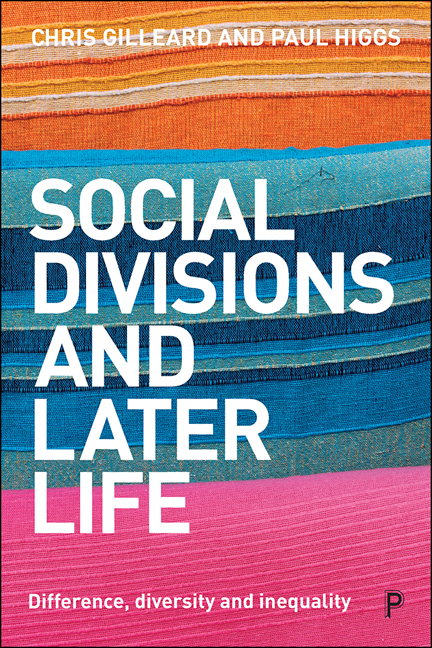Book contents
- Frontmatter
- Contents
- List of Figures and Tables
- Preface
- 1 Social Divisions and Social Differences
- 2 Social Class and Inequality in Later Life
- 3 Ageing and Gender
- 4 Ethnicity, Race and Migration in Later Life
- 5 Disability and Later Life
- 6 Identity and Intersectionality
- 7 Diversity, Difference and Division in Later Life
- References
- Index
3 - Ageing and Gender
Published online by Cambridge University Press: 25 February 2021
- Frontmatter
- Contents
- List of Figures and Tables
- Preface
- 1 Social Divisions and Social Differences
- 2 Social Class and Inequality in Later Life
- 3 Ageing and Gender
- 4 Ethnicity, Race and Migration in Later Life
- 5 Disability and Later Life
- 6 Identity and Intersectionality
- 7 Diversity, Difference and Division in Later Life
- References
- Index
Summary
Sociological writing about class has been criticised for being gender neutral, in the sense that many writers focus on distributions of power, income and advantages that emerged from the workings of the productive economy, a set of institutions and processes that until recently was dominated by men's employment and the profitable returns on capital with scarcely any reference to the role of women (Marshall, 1994). In her seminal paper on women and class analysis, Stanworth (1984) went further and pointed out that this focus missed the importance of both women's employment and the role that gender played in creating the inequalities of power and reward. Retirement too was framed by the termination of men's formal engagement with the labour market. Women's domestic labour was less visible and was assumed to continue in a more or less uninterrupted fashion throughout their adult lives. This is evident in how women's experience of retirement was described as ‘twice as much husband and half as much money’. These lacunae in relation to the gendered nature of formal and informal work and its aftermath in post-working life began to be addressed by the social sciences in the wake of the second-wave feminism of the 1960s and 1970s (Barker, 2015). Only in the last decades of the twentieth century did the role of gender in shaping difference and structuring inequality come to greater prominence with a greater recognition of the gendered nature of later life (Calasanti and Zajicek, 1993; Garner, 1999; Hooyman, 1999). While the focus of this research was initially based on treating ageing as a woman's issue, attention has since explored men's ageing as a relatively underresearched and under-theorised topic (King and Calasanti, 2013; Thompson and Bennett, 2017).
This chapter examines gender as a structured social division, a source of inequality that runs throughout the adult life course. Its realisation in later life will be explored through four themes. The first addresses the interaction between men's and women's paid work and their subsequent economic position in post-working life. The second examines the role of the household economy in maintaining and modifying older men and women's social capital. The third considers the differential experience of health and well-being among older men and women, while the fourth deals with the different representations of gender in later life in literature, the mass media and the market.
- Type
- Chapter
- Information
- Social Divisions and Later LifeDifference, Diversity and Inequality, pp. 41 - 68Publisher: Bristol University PressPrint publication year: 2020



